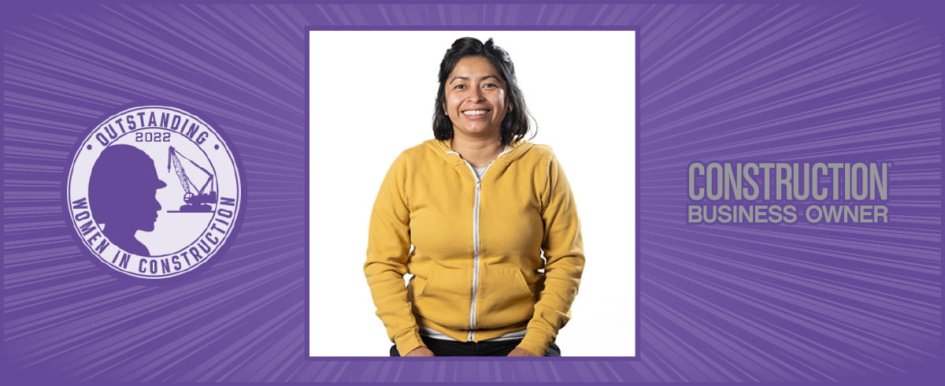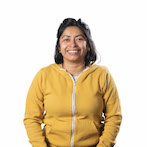
 No. 1 Must-Have: “I'm torn between compassion and patience.”
No. 1 Must-Have: “I'm torn between compassion and patience.”
Consuelo Lockhart was born in Guatemala before being adopted by American parents and raised in Michigan. In high school, she had the opportunity to return to Guatemala to discover her own heritage and reconnect with her biological family. “Seeing the living conditions of the whole population — especially the women — really opened my eyes,” Lockhart said. “I realized I was a lucky one. I had the ability to pursue a degree, to choose if and when to have children. I could focus on a career for myself.” Lockhart hoped to inspire and influence women in Guatemala and make her family proud by harnessing her opportunities, hopefully making a name for herself in the meantime.
While Lockhart was pursuing a Bachelor of Fine Arts with a concentration in functional art from Kendall College of Art and Design, an art professor challenged the class to use a different medium than they were accustomed to for a specific project. Since Lockhart worked mostly with wood materials, the professor encouraged her to take a stab at welding. “I’d never heard about welding growing up, or even the trades in general,” says Lockhart. If it hadn’t been for that professor pushing her out of her comfort zone, she noted, “I most likely would have never touched a welder, and I basically fell in love with it the first time I tried it.”
Once Lockhart was hooked on the trade, she knew she had to pursue a career that included welding. So, she secured a grant that covered a welding and fabrication job training program at a local community college. After the only other woman in the program dropped out, Lockhart said: “I was the only female, so I didn’t have any other women to talk to. Luckily, I had a male professor who was really supportive.” As one of the first two students to complete the course early, Lockhart was sponsored by the college to construct a large metal piece for an art competition, which helped secure her first welding job before she had fully completed the training program.
In 2016, Lockhart moved from Grand Rapids, Michigan, to Indianapolis, Indiana, and applied for the director position at a makerspace location in Indianapolis, which is a place of collaboration that houses all the necessary tools for specific type of creative projects. “I was very honest with them. I said, ‘I don’t know all the things that I need to do to make a space like this work, but I’m always willing to learn and research. If don’t know something, I will figure it out,’” said Lockhart. She got the position and began building the organization from the ground up. But it wasn’t long before the women of Guatemala, and Latinas in general, were at the forefront of her mind.
“I realized if I don’t do this now, if I don’t at least try to pilot what I want to do with this school, then I don’t know if I ever will,” says Lockhart. “So, I asked five of my Latina friends if they would go through a 10-week welding course, and all of them were like, ‘What’s welding?’” She knew it was a tall order, but she was determined to make it work. Once the community saw what she was up to, they were intrigued and impressed, asking to donate money to Lockhart and the space. Soon she had an official organization — Latinas Welding Guild, Inc. — a nonprofit, offering welding training and job placement for marginalized groups.
For the first two years, Lockhart was only able to work at the nonprofit part-time, running three cohorts and five students per class in a 10-week program. However, the program did not provide any certification at the time. “I’m not certified. I’ve never taken a certification test,” said Lockhart, “but that has never prevented me from having any opportunities. I expressed that to students, but I also understood the importance of having some sort of credential that justified the education we were offering.” She knew that providing students with certification was crucial, as it helped secure funding by giving Latinas Welding Guild, Inc., the option of accreditation and helped students find job placement upon graduation. In true Lockhart fashion, she figured out how to offer certification, as well.
Right as Lockhart and crew were preparing to offer a series of classes, the COVID-19 pandemic threw a wrench in the plan. Despite conditions, they were still able to certify 17 students while also launching custom fabrication. The guild was inundated with projects, as many people were quarantined at home, wanting to get things done. In summer 2020, the program opened again for classes. And in 2021, the program graduated 45 students. Now, the class schedules follow the local school system’s calendar to prevent mothers from scrambling to find childcare during training hours.
This year, the guild launched its first two-week, coed welding boot camp, and this fall, the guild launched an equitable employment program, focused on job readiness through self-advocacy, interview preparation and soft-skills training. “It’s really about knowing their rights as an employee,” said Lockhart. “If students are put into situations with potential employers that they’re not comfortable with, they have a group of advisers who will help them. We can’t force employers to care or acknowledge the struggles that marginalized people face.” How to help fix this problem is the question Lockhart continually asks herself.
Though Lockhart is now able to take a salary and pay staff, “The guild is still a grassroots organization,” she said. “But women are graduating the program, whose kids are seeing their moms, seeing women, as capable of having a career and not being forced to stay at home. Now they can actually have the tools to feel more confident, empowered and prove, not just to their family but to themselves, that they can do this.”
